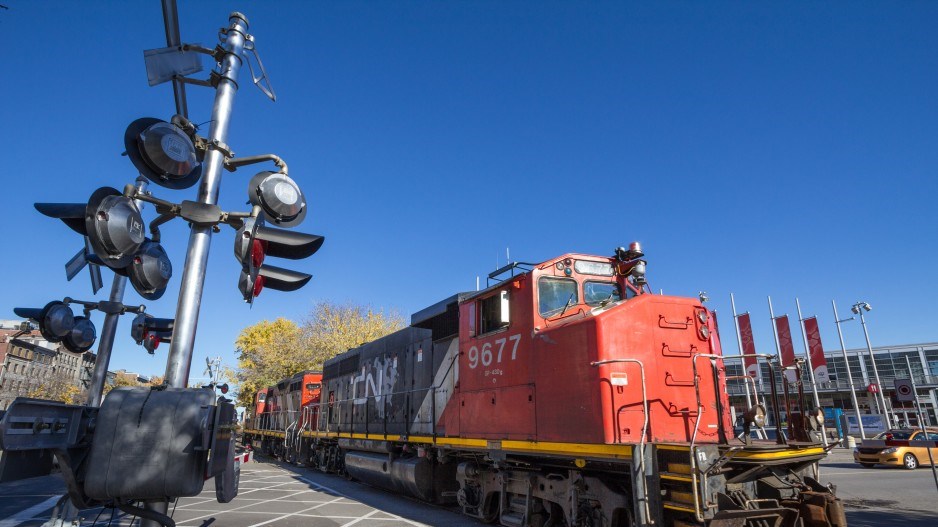Canadians are about to learn just how important railways still are in Canada.
More than 3,000 CN (TSX:CNR, NYSE:CNI) workers are now on strike, and industries that rely on freight to move products – everything from grain to metallurgical coal and gasoline – are sending warning signals to the federal government that the impacts could be severe, if the strike drags on.
Even if the strike is ended by federal legislation, that could take days or weeks, and by then there could be significant impacts on industries, like lumber and mining in B.C.
CN moves $250 billion worth of goods annually.
In B.C., a prolonged freight rail strike could exacerbate a downturn in the forestry sector, if lumber, logs, pulp, and wood pellets that move through B.C. ports suddenly stop moving. And ports in Vancouver and Prince Rupert -- which are major economic engines for both cities -- would eventually feel the impact.
"This development is troubling for us," said Susan Yurkovich, CEO of the Council of Forest Industries. "It comes at a time when our sector is already facing significant challenges."
A freight rail strike could also reverse Vancouver’s temporary reprieve from high gasoline prices, according to Dan McTeague, president of Canadians for Affordable Energy.
“Vancouver demand is being increasingly met by truck and rail and it’s one if the reasons wholesale prices are much higher, especially in the Lower Mainland, given pipeline constraints,” McTeague said. “This could hurt supplies within days if all cars are halted.”
Some industries in B.C., like mining, are heavily reliant on railways, not only to move exports to port, but also to bring in supplies.
Conuma Coal operates three metallurgical coal mines in northeastern B.C. that rely on CN to ship its steelmaking coal through Prince Rupert.
“Conuma has no other way for its product to be delivered to the market,” said Conuma CEO Brian Sullivan.
“Any CN outage at all is very harmful to Conuma's business and to the jobs and well being of the more than 900 women and men we employ directly, plus the additional thousands of jobs that depend on mining indirectly, such as maintenance contractors, equipment suppliers.
“If the rail strike continues, Conuma will be forced to examine scaling back parts of our operations while the railroad is shut down by the Teamsters strike."
“A strike by CN workers will have a seriously harmful effect on the industry,” Mining Association of Canada president Pierre Grattonsaid in a press release. “The shipment of fuel and other supplies to mine sites will be compromised as will the transport of mineral products.
“MAC members have advised that this strike will result in a severe reduction or elimination of railway capacity and will trigger the closure of mines with concurrent lay-offs of thousands of employees beginning in a matter of days.”
Alberta’s oil sector would be pinched by a prolonged strike, since a lack of pipeline capacity has forced producers to move more and more oil by rail. And farmers in Saskatchewan rely on rail to ship grain, canola and other agricultural products.
The Alberta government and MAC are calling on the federal government to step in with legislated binding arbitration to end the strike. But Parliament is not scheduled to resume until December 5.
If the strike lasts even that long," it would be terrible for our industry," Yurkovich said. "We just cannot afford to have a disruption in our supply chain."
"Unfortunately, even this short wait could result in serious damage not just to the Alberta economy, but to the Canadian economy as a whole," said Alberta Energy Minister Sonya Savage. "We call on the prime minister to immediately call back Parliament to enact emergency back-to-work legislation for CN Rail.”
B.C.’s key exports are wood products, pulp and paper, metallurgical coal and copper, much of which moves by rail, either to B.C. ports or directly by rail into the U.S.
The Teamsters Canada union says wages are not a major issue in the current bargaining deadlock – safety and drug coverage are.
According to the union, CN requires workers to operate trains from outside of the locomotive, “hanging on to moving trains with one hand while operating a remotely controlled locomotive with the other.
“Railroaders are expected to do this in rain and in freezing temperatures, sometimes for distances of up to about 17 miles," the union states. "The union’s demands to cease these dangerous practices have fallen on deaf ears.”
The company has also forced workers to work longer hours and make it difficult for them to take time off, the Teamsters say.
“Fatigue has been recognized by the Transportation Safety Board as a major safety problem in this industry,” Teamsters Canada president Lyndon Isaak said in a press release.”
The union is also refusing to accept a lifetime cap on prescription drug coverage.
CN says it has offered to go to binding arbitration to settle the dispute, but the offer was rejected.
“If a settlement cannot be reached this weekend, we will once again encourage the union leadership to accept binding arbitration as an alternative to disrupting the Canadian economy,” CN COO Rob Reilly said in a press release.
“We remain committed to constructive talks to reach an agreement without a work stoppage.”




